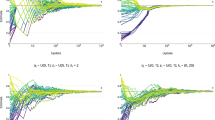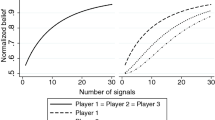Abstract
This paper investigates a non-Bayesian social learning model, in which each individual updates her beliefs based on private signals as well as her neighbors’ beliefs. The private signal is involved in the updating process through Bayes’ rule, and the neighbors’ beliefs are embodied in through a weighted average form, where the weights are time-varying. The authors prove that agents eventually have correct forecasts for upcoming signals, and all the beliefs of agents reach a consensus. In addition, if there exists no state that is observationally equivalent to the true state from the point of view of all agents, the authors show that the consensus belief of the whole group eventually reflects the true state.
Similar content being viewed by others
References
Banerjee A, A simple model of herd behavior, The Quarterly Journal of Economics, 1992, 107(3): 797–817.
Bikhchandani S, Hirshleifer D, and Welch I, A theory of fads, fashion, custom, and cultural change as informational cascades, The Journal of Political Economy, 1992, 100(5): 992–1026.
Smith L and Sorensen P, Pathological outcomes of observational learning, Econometrica, 2000, 68(2): 371–398.
Gale D and Kariv S, Bayesian learning in social networks, Games and Economic Behavior, 2003, 45(2): 329–346.
Kagel J H and Roth A E, Handbook of Experimental Economics, Princeton University Press, Princeton, 1995.
Rabin M, Psychology and economics, Journal of Economics Literature, 1998, 36: 11–46.
DeGroot M H, Reaching a consensus, Journal of the American Statistical Association, 1974, 69(345): 118–121.
DeMarzo P M, Vayanos D, and Zwiebel J, Persuasion bias, social influence, and unidimensional opinions, The Quarterly Journal of Economics, 2003, 118(3): 909–968.
Golub B and Jackson M O, Naïve learning in social networks: Convergence, influence, and the wisdom of crowds, American Economic Journal: Microeconomics, 2010, 2(1): 112–149.
Jadbabaie A, Lin J, and Morse A, Coordination of groups of mobile autonomous agents using nearest neighbor rules, IEEE Trans. Automatic Control, 2003, 48(6): 988–1001.
Olfati-Saber R and Murray R M, Consensus problems in networks of agents with switching topology and time-delays, IEEE Trans. Automatic Control, 2004, 49(9): 1520–1533.
Ren W and Beard R W, Consensus seeking in multiagent systems under dynamically changing interaction topologies, IEEE Trans. Automatic Control, 2005, 50(5): 655–661.
Yu W, Chen G, Cao M, and Kurths J, Second-order consensus for multiagent systems with directed topologies and nonlinear dynamics, IEEE Trans. Systems, Man, and Cybernetics-Part B, 2010, 40(3): 881–891.
Jadbabaie A, Molavi P, Sandroni A, and Tahbaz-Salehi A, Non-Bayesian social learning, Games and Economic Behavior, 2012, 76(1): 210–225.
McPherson M, Smith-Lovin L, and Cook J M, Birds of a feather: Homophily in social networks, Annual Review of Sociology, 2001, 27: 415–444.
Savage L J, The Foundations of Statistics, Wiley, New York, 1954.
Seneta E, Non-Negative Matrices and Markov Chains, Springer, New York, 1981.
Meyer D C, Matrix Analysis and Applied Linear Algebra, SIAM, Philadelphia, 2000.
Author information
Authors and Affiliations
Corresponding author
Additional information
This research is supported by the National Natural Science Foundation of China under Grant Nos. 61074125 and 61104137, the Science Fund for Creative Research Groups of the National Natural Science Foundation of China under Grant No. 61221003, and the National Key Basic Research Program (973 Program) of China under Grant No. 2010CB731403.
This paper was recommended for publication by Editor ZOU Guohua.
Rights and permissions
About this article
Cite this article
Liu, Q., Fang, A., Wang, L. et al. Social learning with time-varying weights. J Syst Sci Complex 27, 581–593 (2014). https://doi.org/10.1007/s11424-014-1195-0
Received:
Revised:
Published:
Issue Date:
DOI: https://doi.org/10.1007/s11424-014-1195-0




